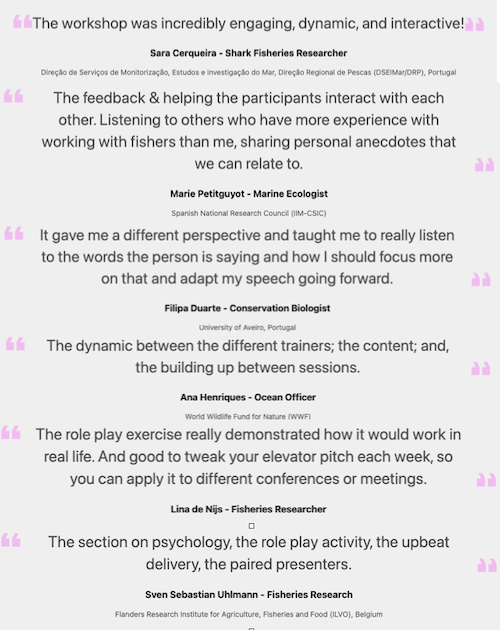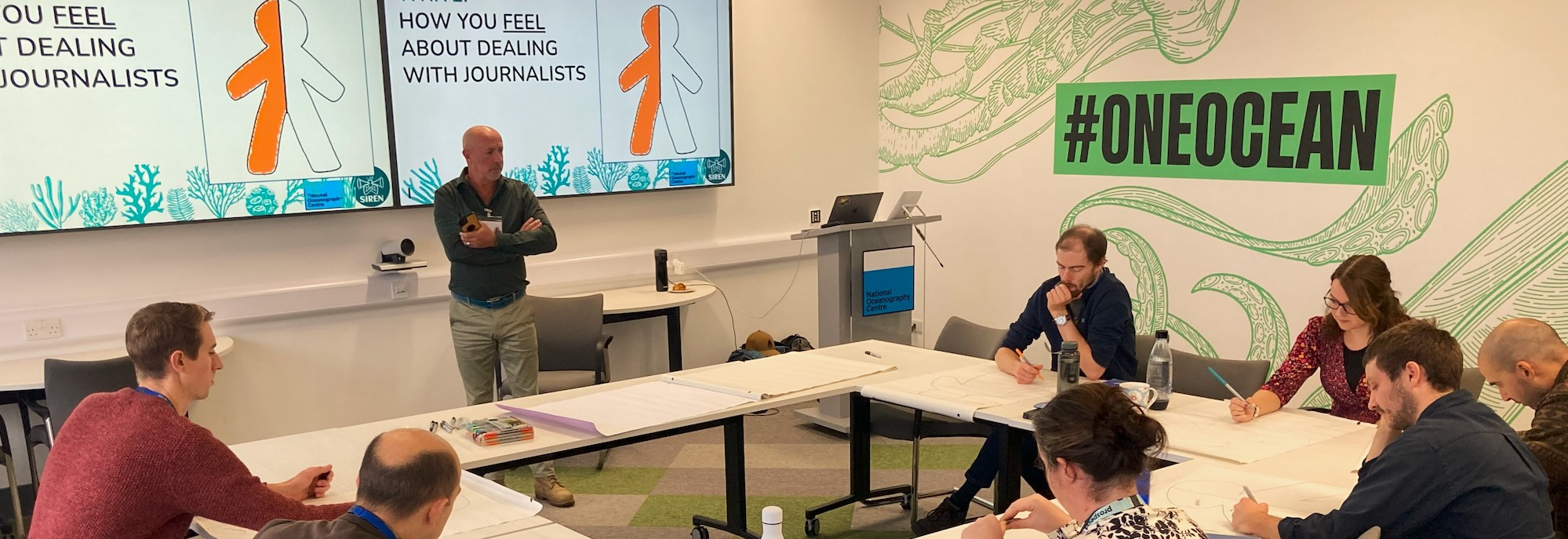
Case Studies
Reports on work with recent clients
Below are Case Studies of our work with the National Oceanography Centre (NOC), ARIA (Advanced Research & Intervention Agency) and CIBBRiNA (EU project working to minimise bycatch of endangered, threatened and protected species).
CASE STUDY 1
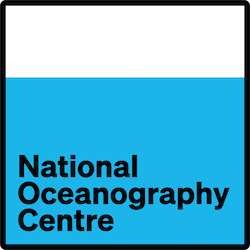
Customer: Jess Allen (Communications Manager)
Company: National Oceanography Centre, UK
Industry: Research, Teaching and Technology Development in Ocean and Earth Science
The National Oceanography Centre (NOC) is one of the world’s top oceanographic institutions, making sense of our changing seas and helping to better understand the links between our ocean and climate change. Having recently undergone a rebranding, the NOC has established its mission to ensure that “everyone feels empowered and inspired to help our ocean thrive by telling compelling ocean stories with clarity of purpose”.
Since 2021, the NOC have worked with Siren Calling and our sister organisation Incredible Oceans to provide an array of bespoke communication training packages to scientists, technicians, engineers and early-career researchers. Recognising the communication needs of marine researchers, we were able to use their unique insight and experience within ocean sciences to provide communications training specifically catering for marine and environmental researchers.
Working with Siren Calling, has enabled NOC to embed a culture of impactful and meaningful public engagement across the institution, helping personnel feel more confident and in control during presentations and interviews, while also making the most of any time in the spotlight, promoting the importance of ocean research to different segments of society.
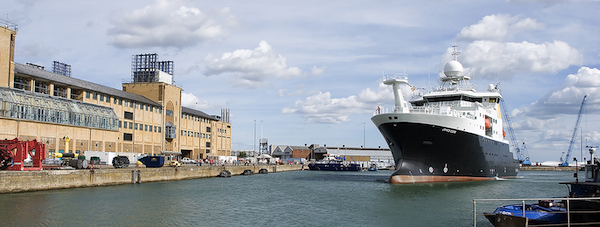
How Best To Fly The Flag Of Ocean Science?
As the UK’s largest oceanographic institution, personnel at the NOC are increasingly called upon by the press and media to give statements, sound bites and interviews to support news stories with an ocean focus. Recognising the opportunity this coverage affords to highlight the work of the NOC and raise the profile of ocean science, the NOC approached Incredible Oceans to develop a bespoke ‘Introduction to Science Communication’ course, giving scientist the confidence to communicate effectively to different audiences and helping them to take their first steps into public engagement.
As the links between climate change and ocean science have become better known in the public arena, the NOC began attending the COP climate conferences with an increasing presence year-upon-year. Building upon the introductory training, COP attendees wanted to take their communications training to the next level. In response, Incredible Oceans and Siren Calling developed bespoke training courses focusing on videography and how to conduct interviews with the press. With the next COP happening just a fortnight after the training, participants were able to put their new skills to the test at high-profile press conferences focusing on the ocean and climate. With over 100 NOC staff having attended communications training in one form or another, the effect has been to instill an active culture of public engagement across the institution.
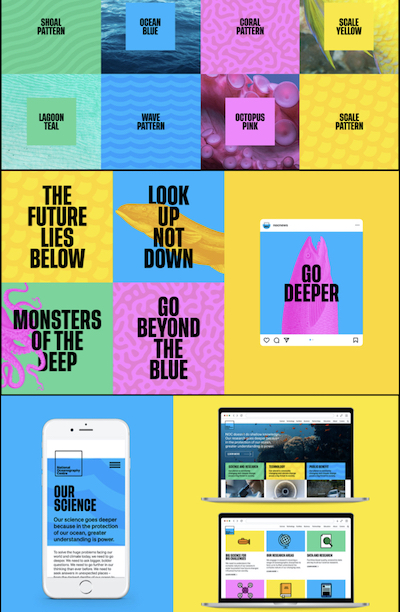
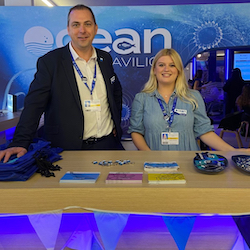
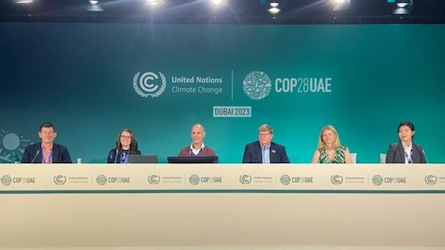
The Challenge
Having obtained a new charitable status, the NOC underwent a rebranding to help engage with different audiences, and cement the institution as a leader in ocean research within the wider oceanographic community. Part of this was to increase the visibility of the work being conducted at the NOC, and help different stakeholder better understand and engage with the research.
Why The NOC Chose Siren Calling
As an alumni of the NOC, Siren/Incredible Oceans trainer Dr Russell Arnott has one foot in academic research and the other in science communication, allowing him a unique insight into the world of ocean science and how to communicate broad environmental science effectively to different audiences. Drawing upon the journalism expertise and social science experience of Ian Rowlands, this unique combination of skill sets perfectly placed Ian and Russell and associate Emily May Armstrong, to deliver impactful communications training.
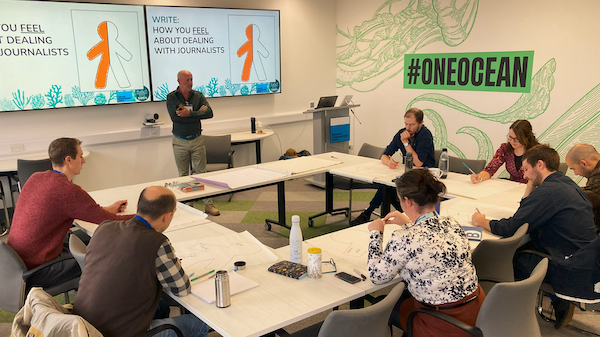
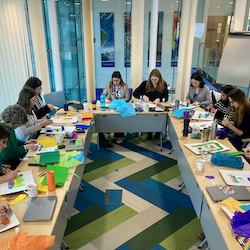
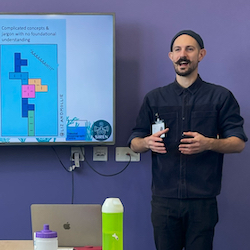
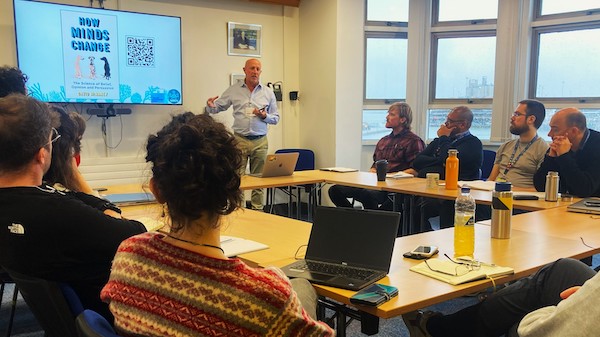
How The NOC Responded
Recognising the time and money constraints of the client yet wanting to provide a high-quality of service, we distilled our normally 3-day-long training course down to an intensive cost and time effective 1-day course, focussing on the essentials of environmental science communication. Responding closely to informal participant feedback and formal course evaluations, the course has been honed with each progressive iteration ensuring it meets the needs of both the participants and the goals set out by the NOC. Keen to put their new communication skills to the test and push themselves further, participants on the Introduction to Comms course naturally demanded ‘what’s next?’. In response to this, we partnered with environmental videography trainer Laurence Hall, to deliver a 1-day basic introduction to video-making, covering the basics of filming, scripting, storyboarding and editing allowing researchers to make quick, easy and impactful videos for social media.
In addition, many researchers had been approached by various media outlets to provide interviews and input into breaking news stories around the ocean. Keen to help researchers capitalise on this time in the spotlight, We drew upon the media expertise of Ian Rowlands to put together a 1-day course covering the basics of interview techniques and how to effectively work with the media for maximum effect.
How It Was A Success
Within any form of science communication, evaluation is crucial in informing the efficacy of the intervention but also guiding improvements and the audiences / clients needs. As leaders in marine science communication, Incredible Oceans undertakes evaluations after each training course. We’re proud that over 90% of NOC participants reported an increase in confidence when communicating to different audiences after only a 1-day course. Instead of cherry-picking choice quotations that make us sound amazing, here we present the full written feedback (both positive and critical) from participants as a wordcloud of the top 40 words. It provides a snapshot of not only what the course entails but also how the training participants responded to the training.
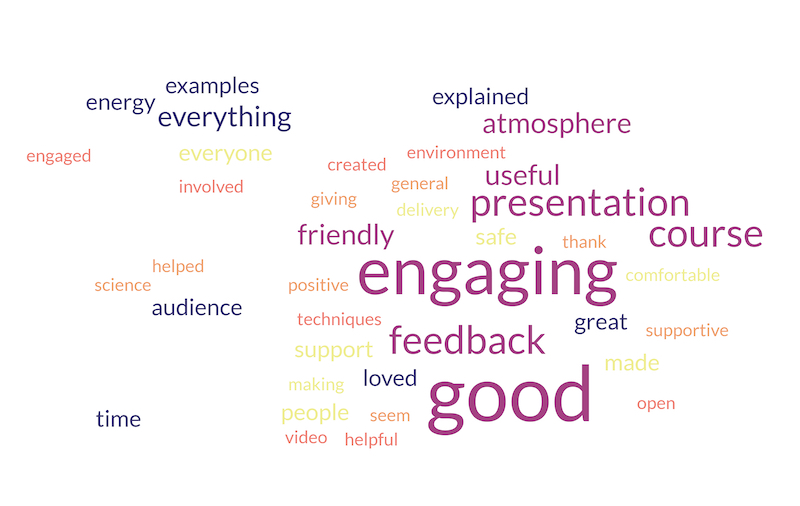
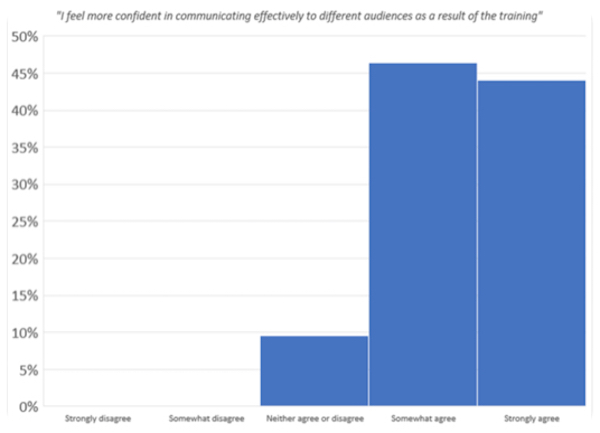
Overall Results
To date, over a hundred NOC employees have taken part in Incredible Oceans training courses, helping to improve participants’ confidence and communication skills while also embedding a culture of public engagement across the institution. As the NOC continues to develop and increase stakeholder engagement and awareness, having a large staff pool of trained communicators at hand is helping to showcase the vital oceanographic research and its importance to wider society.








CASE STUDY 2
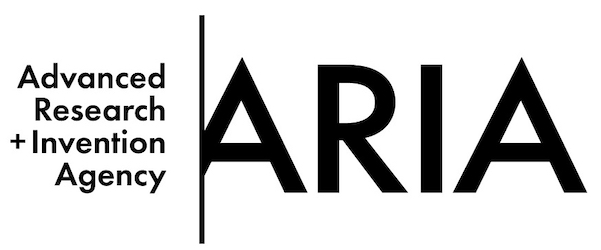
Forecasting Climate Tipping Points
Customer: Prof Sarah Bohndiek (Programme Co-Director) & Dr Gemma Bale (Programme Co-Director)
Organisation: Advanced Research + Invention Agency (ARIA) : Forecasting Climate Tipping Points
Industry: Research & Development, Science & Technology, Climate Science, Climate Change
The Advanced Research + Invention Agency (ARIA) is the UK’s flagship “moonshot” science agency. It funds high-risk, high-reward research with the potential to transform society. With a mandate to move fast, think big, and back visionary science, ARIA empowers researchers to tackle the most complex challenges of our time. One of its most ambitious initiatives is the Forecasting Tipping Points Programme—a £81 million investment to develop the world’s first early warning system for catastrophic climate shifts. The programme unites 27 international teams across climate science, AI, physics, and engineering to monitor and model critical Earth systems. Given the programme’s broad remit and growing media profile, Siren Calling and Incredible Oceans developed a bespoke communications training package. This was delivered at the inaugural in-person meeting of the Forecasting Tipping Points teams.
Why Communication Matters
ARIA’s programme brings together personnel from tech start-ups, data science, climate modelling, and ocean research. These teams must communicate not only with the media and general public, but also with future funders—and crucially, with each other. To support this, Siren Calling designed training that helped participants speak with clarity, confidence, and cohesion. The goal was to create a lasting legacy: empowering researchers to become advocates for STEM careers, effective science communicators, and trusted voices in the climate conversation.
Communication, Clarity, Cohesion, Climate...
In a programme as ambitious as Forecasting Tipping Points, communication isn’t a luxury; it’s essential. These teams are developing world-first technologies to detect and respond to climate shifts. Their impact depends on how well they convey urgency, credibility, and relevance to non-specialist audiences. The Tipping Points programme brings together a diverse cohort of researchers and innovators from across academia, industry, tech start-ups, engineering, data science, climate modelling and field measurements. This diversity is a strength but also presented a challenge: how do you build shared understanding and cohesion among teams who speak different technical languages and approach problems from different angles?
Tailored communication training bridges that gap. It empowers participants to explain breakthroughs without jargon, articulate risk without alarmism, and connect their work to real-world consequences. In a landscape where public understanding and political will are critical, clarity can be the difference between influence and invisibility. Our communication training is designed precisely for this. We help researchers and innovators sharpen their messaging, master audience psychology, and craft narratives that resonate, whether they're briefing ministers, speaking to media, or presenting at academic conferences.
The Challenge
As a high-profile, publicly funded agency, ARIA operates under intense scrutiny. Its communication challenge lies in translating complex, high-risk innovation into narratives that resonate beyond academia. With multidisciplinary teams tackling climate tipping points, ARIA needed to ensure that its experts could speak with clarity and relevance to policymakers, journalists, and the public. Communication became the bridge between breakthrough science and real-world impact.
Why ARIA Chose Siren Calling?
ARIA programme co-director Prof Sarah Bohndiek first connected with Russell Arnott at the Challenger Society Annual Conference. Russell’s background in climate research and science communication gave him unique insight into the challenges of engaging diverse audiences. Drawing upon the journalism expertise and social science acumen of Ian Rowlands, this combination of skill sets uniquely placed Ian and Russell to deliver this bespoke communications training package for ARIA.
How ARIA Responded
ARIA convened the Forecasting Tipping Points cohort for a three-day residential designed to foster collaboration and cohesion. With participants drawn from a rich mix of disciplines, the event helped teams connect, understand each other’s contributions, and build a shared sense of purpose. Crucially, it set the tone: each participant was to act as an ambassador for the programme. Our communications training sat at the heart of the residential. Through dynamic workshops, participants scripted, redrafted, and rehearsed elevator pitches, presenting them to the full cohort. This wasn’t just about delivery. It was about distilling complex science into compelling, adaptable narratives. By the end of the training, each team had crafted a versatile script they could tailor for press interviews, public talks, stakeholder briefings, or political engagement.
How It Was A Success
As leaders in marine science communication, we evaluate every training course. We listen to participant feedback and adapt the course for future delivery. We’re proud that 100% of participants reported increased confidence in communicating their work after just one day of training.
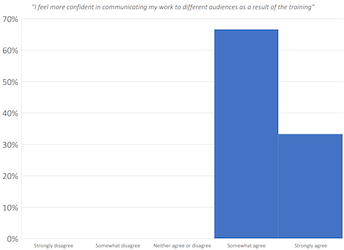
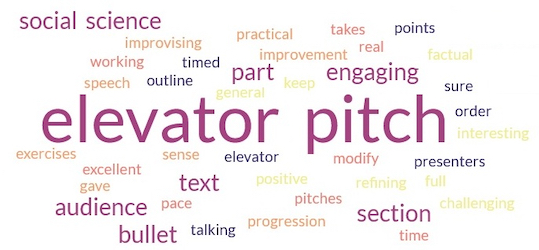
Overall Results
ARIA’s Forecasting Tipping Points programme continues to attract significant media attention. Coverage in The Guardian, New Scientist, and BBC News has spotlighted its bold ambition and scientific significance. As journalists, stakeholders, and policymakers turn their gaze toward the programme, cohort participants are ready. Thanks to the training, they can represent their work with clarity, confidence, and cohesion, ensuring ARIA’s message lands powerfully, no matter who’s listening.
"We were delighted with the fun and engaging workshop that Russell and Ian led. Our attendees enjoyed the practical training exercises supported by evidence from the social sciences. They found the elevator pitch exercise challenging and valuable. As well as excellent training in communication, Russell and Ian also highlighted its importance in tackling the climate crisis. We would highly recommend them and their workshop."
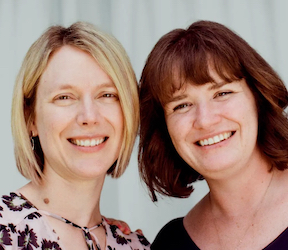
Prof Sarah Bohndiek + Dr Gemma Bale | Forecasting Tipping Points Programme Directors
CASE STUDY 3
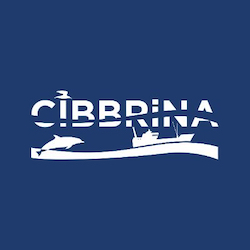
Training EU fishers, authorities, scientists, and stakeholders to communicate about bycatch of Endangered, Threatened and Protected species in the North-East Atlantic, Baltic, and Mediterranean.
Customer: Marije Siemensma, CIBBRiNA Coordinator, Dutch Ministry of Agriculture, Fisheries, Food Security & Nature
Company: CIBBRiNA (EU) and ProSea (NL)
Industry: Research, Sustainable Fisheries, Bycatch Reduction
CIBBRiNA is a European research initiative focussed on reducing bycatch of endangered, threatened, and protected species such as turtles, sharks and seabirds. To achieve this, scientists must work closely with fishers—building trust, sharing knowledge, and encouraging sustainable fishing practices.CIBBRiNA brings together researchers, policymakers, and fishing communities across the North Atlantic, Baltic, and Mediterranean. The success of the project depends on building trust with fishers, helping researchers to gather vital data on bycatch while also encouraging the adoption of sustainable fishing practices.
To support this mission, in partnership with Prosea (Netherlands) we designed a bespoke fisheries communication training programme. Delivered online to CIBBRiNA members, this training helped scientists develop the skills needed to engage fishing communities and promote bycatch reduction strategies across Europe.
Why Communication Matters...
Fisheries researchers rely on working alongside fishers onboard fishing vessels to gather data. This requires building trust and a rapport with the fishers, not only to gain access to their space but to also learn from their experience and insights. As well as data-gathering, there is also need to persuade crews to trial or adopt new gear and techniques that reduce bycatch. Clear, empathetic communication is essential; fisheries scientists must explain their intentions and research without jargon, listen actively, and show respect for the knowledge and experience fishers bring to the table. Effective communication builds trust and relationships, reduces conflict, and increases the quality of the data and the likelihood that sustainable fishing practices will be embraced.
This fisheries communication training gave researchers practical tools to build trust, reduce conflict, and explain their research in ways that resonate.
The Challenge
As a European consortium, CIBBRiNA researchers work at institutions across the European Union. While they brought extensive scientific expertise, many had limited (or bad!) experiences in direct engagement with fishers. Challenges include:
- Jargon and complexity: scientific language can alienate non-specialists.
- Conflict and distrust: fishers often view scientists as regulators rather than collaborators.
- Gender dynamics: female researchers can face difficulties when working in the predominantly male fishing communities of European countries.
Our training needed to equip researchers with strategies for clear communication, empathy, conflict resolution and building stronger relationships.
Why CIBBRiNA Chose Us?
We brought experience in science communication and public engagement in and around ocean science and conservation. ProSea NL contributed fisheries-specific training expertise, whilst together we added creative approaches to storytelling and social science. Together, the team delivered a unique fisheries communication training programme tailored to the realities of working with fishers in diverse cultural contexts.
How CIBBRiNA Responded
The consortium developed a three part online workshop series with each session focussing on a different aspect of communication:
• Social science & psychology: understanding human behaviour & motivation. • Jargon busting & storytelling: making science accessible & memorable. • Conflict resolution & negotiation: strategies for handling disagreement & building consensus.
A standout moment was the role-playing exercise, where participants took turns trying to win over a 'sceptical fisherman' giving researchers a safe space to practice persuasion, empathy, and resilience. Weekly homework tasks included writing scripts, filming short videos, and reflecting on past experiences. These were reviewed in group sessions, creating a cycle of learning and improvement.
How It Was A Success
Within any form of science communication, evaluation is crucial in informing the efficacy of the intervention but also guiding improvements and the audiences / clients needs. As leaders in science communication, we undertake evaluations after each training course. We’re proud that over 80% of participants reported an increase in confidence when communicating with fishers.
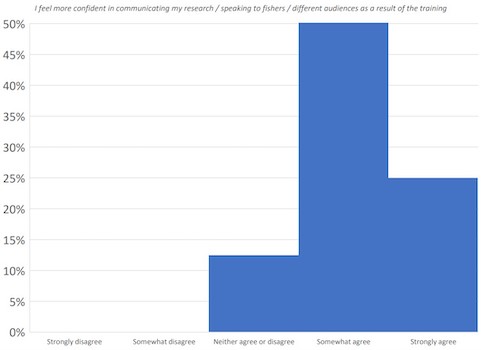
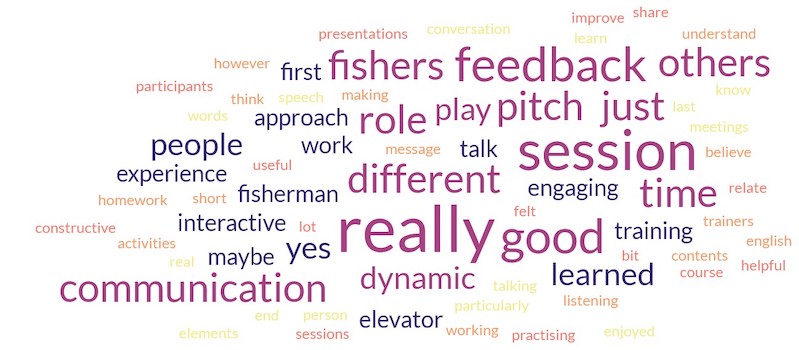
Overall Results
The CIBBRiNA project continues to champion bycatch reduction strategies and promote sustainable fishing practices across Europe. Thanks to this communications training, the consortium are now better equipped to build trust with fishers, gather more reliable data, and increase the likelihood that those fishers will adopt bycatch reduction strategies.
